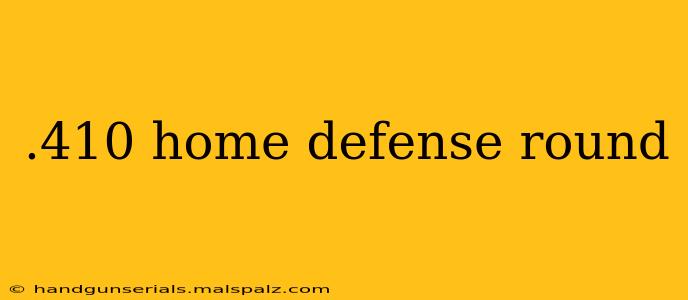The .410 bore shotgun is often overlooked in the home defense conversation, overshadowed by larger calibers like 12-gauge and 20-gauge. However, understanding its capabilities and limitations is crucial for making informed decisions about personal safety. This article delves into the .410's suitability for home defense, exploring its advantages, disadvantages, and considerations for responsible firearm ownership.
Advantages of the .410 for Home Defense
While not the most popular choice, the .410 bore offers some unique advantages for home defense:
-
Reduced Recoil: The significantly lower recoil compared to larger gauges makes the .410 more manageable, especially for smaller or less experienced shooters. This reduced recoil translates to faster follow-up shots and improved accuracy under stress. This is a critical advantage in a high-pressure situation.
-
Compact and Lightweight: .410 shotguns often come in smaller, more compact packages. This makes them easier to maneuver in tight spaces, a significant consideration within the confines of a home. Their lighter weight also contributes to easier handling and faster target acquisition.
-
Quieter than Larger Gauges: While still loud, the .410 generally produces a less intense report than larger shotguns, which can be beneficial in reducing the risk of hearing damage for the homeowner and minimizing the disruption to neighbors.
-
Ammunition Availability: Although not as widely stocked as 12-gauge, .410 ammunition is readily available at most sporting goods stores and online retailers.
Disadvantages of the .410 for Home Defense
Despite its advantages, the .410 bore also presents drawbacks:
-
Less Stopping Power: This is arguably the most significant drawback. The smaller projectile carries less energy than larger calibers, potentially requiring multiple hits for effective incapacitation. Shotguns, in particular, rely on the pattern of shot to create a wider wound channel and increase the likelihood of stopping a threat. With the .410, achieving the same effect is challenging.
-
Limited Shot Pattern: The smaller gauge results in a tighter shot pattern, making accurate shot placement more critical. At close range, this might not be as much of an issue, but the effective range is significantly reduced compared to larger gauges.
-
Slug Performance: While .410 slugs are available, their performance is often less consistent and less powerful than larger caliber slugs. Therefore, they should be considered as a last resort when shot isn't an option, given the other limitations of this caliber for defense.
.410 Ammunition Considerations
Choosing the right ammunition is critical for home defense. The primary choice lies between shot and slugs:
-
Shot: While offering a wider spread at close range, the reduced energy of the .410's shot necessitates accurate placement to ensure effective incapacitation. Consider buckshot loads for a more potent impact.
-
Slugs: .410 slugs offer greater penetration power than shot, but accuracy is even more critical due to the smaller projectile. However, they are less preferable due to the reduced accuracy and penetration compared to other calibers.
Conclusion: Is a .410 Suitable for Home Defense?
The suitability of a .410 bore shotgun for home defense depends heavily on individual circumstances, proficiency, and risk tolerance. While offering advantages in recoil management, size, and weight, its reduced stopping power and limited shot pattern are significant drawbacks. Responsible gun owners should carefully weigh these factors, prioritize proper training, and select ammunition appropriate for their situation and capabilities. Ultimately, the best caliber for home defense is the one the user can handle effectively and accurately under stress. Consider extensive practice and professional training before relying on any firearm for self-defense. This is not a recommendation for .410 as a home-defense firearm, but an analysis of its capabilities and limitations. Always consult with law enforcement and firearms experts before making a decision.

